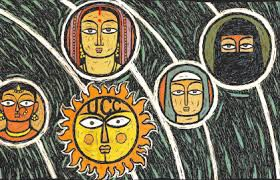UNIFORM CIVIL CODE IS NOT ONE CIVIL CODE – Dr. Ambedkar had chided the muslims for opposing it



Uniform Civil Code is a much-discussed subject. It is opposed by some sections, and considered most desirable by many more sections. One of the major objections advanced against its implementation is that it is not possible to have one law for personal matters of all the communities, as it covers diverse aspects such as marriage, succession, inheritance, adoption, and divorce.
Even as the matter is debated, and people have even come up with drafts of a Uniform Civil Code, I think the debate is unnecessary. Uniform Civil code does not mean One Civil Code, but rather implies uniformity of laws covering particular civil relations.
UCC was extensively debated on 23rd November 1948 in the Constituent Assembly. It was Art. 35 in the Draft Constitution, (Art. 44 in Constitution). A number of Muslim members objected to the Article, contending that, 1. It ran counter to the Freedom of Religion provided by Art. 19 of the Draft Constitution (Art. 25 in the Constitution of India); and 2. It was tyrannous to the minorities.
KM Munshi, Alladi Krishnaswamy Iyer, and Dr. BR Ambedkar refuted the objections and laid out the scheme of the UCC is a very cogent manner as under:
1. Art. 19 (Art. 25 in the present Constitution) already provides for the State to bring in laws in the secular space of religions, such as civil relations; as also for social reforms and welfare. It reads as follows:
25. Freedom of conscience and free profession, practice and propagation of religion
(1) Subject to public order, morality and health and to the other provisions of this Part, all persons are equally entitled to freedom of conscience and the right freely to profess, practise and propagate religion
(2) Nothing in this article shall affect the operation of any existing law or prevent the State from making any law
(a) regulating or restricting any economic, financial, political or other secular activity which may be associated with religious practice;
(b) providing for social welfare and reform or the throwing open of Hindu religious institutions of a public character to all classes and sections of Hindus
Explanation I. The wearing and carrying of kirpans shall be deemed to be included in the profession of the Sikh religion;
Explanation II. In sub clause (b) of clause reference to Hindus shall be construed as including a reference to persons professing the Sikh, Jain or Buddhist religion, and the reference to Hindu religious institutions shall be construed accordingly
2. So the mandate of Art. 35 (Art. 44 in the Constitution of India, relating to UCC) merely underwrites the resolve of the People to be governed by such laws in future.
3. KM Munshi: “We want to divorce religion from personal law, from what may be called social relations or from the rights of parties as regards inheritance or succession. What have these things got to do with religion I really fail to understand? Take for instance the Hindu Law Draft which is before the Legislative Assembly. If one looks at Manu and Yāgnyavalkya and all the rest of them, I think most of the provisions of the new Bill will run counter to their injunctions. But after all we are an advancing society. We are in a stage where we must unify and consolidate the nation by every means without interfering with religious practices. If however the religious practices in the past have been so construed as to cover the whole field of life, we have reached a point when we must put our foot down and say that these matters are not religion, they are purely matters for secular legislation. This is what is emphasised by this article”.
4. Alladi Krishnaswamy Iyer: “A Civil Code, as has been pointed out, runs into every department of civil relations, to the law of contracts, to the law of property, to the law of succession, to the law of marriage and similar matters. How can there be any objection to the general statement here that the States shall endeavour to secure a uniform civil code throughout the territory of India”?
5. Dr. BR Ambedkar:
“Coming to the amendments, there are only two observations. My first observation would be to state that members say that the Muslim personal law in India was immutable and uniform throughout India. Now I wish to challenge that statement. I think most of my friends who have spoken on this amendment have quite forgotten that up to 1935 the NWFP was not subject to the Shariat Law. It followed the Hindu Law in the matter of succession and in other matters, so much so that it was in 1939 that the Central Legislature had to come into the field and to abrogate the application of the Hindu Law to the Muslims of the NWFP and to apply the Shariat Law to them. That is not all. Apart from NWFP, up till 1937 in the rest of India, in various parts, such as UP, CP and Bombay, the Muslims to a large extent were governed by the Hindu Law in the matter of succession. In order to bring them on the plane of uniformity with regard to the other Muslims who observed the Shariat Law, the Legislature had to intervene in 1937 and to pass an enactment applying the Shariat Law to the rest of India.
“I am also informed by my friend, Shri Karunakara Menon, that in North Malabar the Marumakkathayam Law applied to all, not only to Hindus but also to Muslims. It is to be remembered that the Marumakkathayam Law is a Matriarchal form of law and not a Partriarchal form of law.
“The Mussulmans, therefore, in North Malabar were up to now following the Marumakkathyam law. It is therefore no use making a categorical statement that the Muslim law has been an immutable law which they have been following from ancient times. That law as such was not applicable in certain parts and it has been made applicable ten years ago”.
The above extracts form the Constituent Assembly Debates are ample testimony to the fact that the present twist being given to the Uniform Civil code debate is totally unnecessary. If not for some strange suspension of mental faculties by most commentators, both for and against UCC, there would not even be a debate.
What is most reprehensible is the position taken by the Muslim clerics. The 1937 Act was brought by the British to compel Muslim communities following their own cultural practices to conform to Shari’a. It was a virtual Uniform Muslim Code. In fact, it was an oppressive One Muslim Code, which extinguished the cultural rights of many Muslim communities in NWFP, Gujarat, Malabar, and of many other autonomous communities. For these clerics to pretend that there should not be a uniform application of the UCC principle in a Secular Democratic Republic is the worst kind of hypocrisy. It is also an attempt to keep their control of the various Muslim communities at the expense of their autonomy.
What is required now is to push ahead and build public support for the move. Law Commission’s move is a good starting point.
To conclude, Uniform Civil Code is not One Civil Code, it is only a uniform application of the founding principles of our Constitution.
DISCLAIMER: The author is solely responsible for the views expressed in this article. The author carries the responsibility for citing and/or licensing of images utilized within the text.
